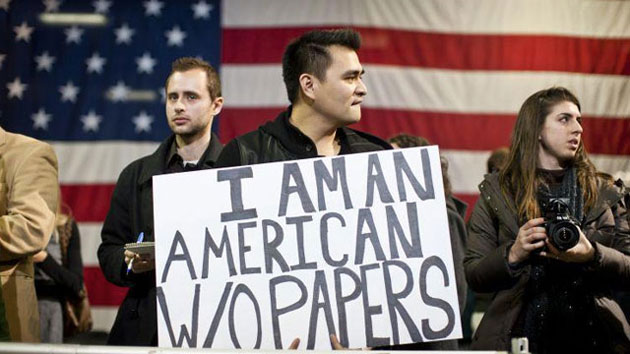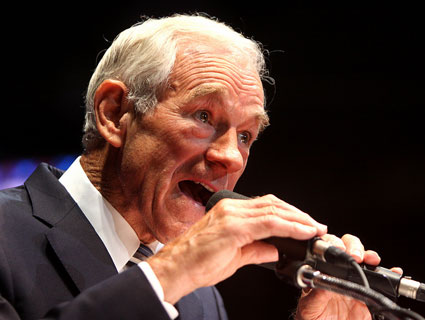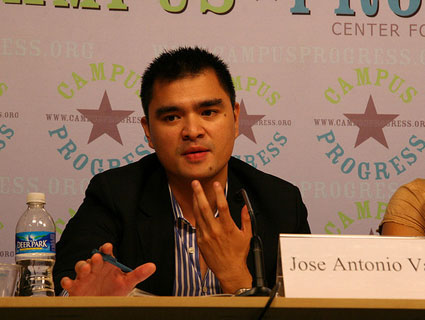
Courtesy Define American
There’s a scene in the new documentary Documented when former Washington Post reporter turned immigration reform advocate Jose Antonio Vargas goes to see Mitt Romney speak before the Iowa caucus. Four years before, Vargas had covered the caucus for the Post, but this time around he stood on the side of a townhall-style event in Cedar Rapids, holding a sign that read “I AM AN AMERICAN W/O PAPERS.” Ever since his blockbuster New York Times Magazine article, “My Life As an Undocumented Immigrant,” came out in 2011, Vargas has become, in his words, “a walking uncomfortable conversation,” and his presence at the Romney talk was, well, sort of awkward.
Eventually, the local police came at the behest of the event’s host and asked him to leave. On his way to the exit, Vargas turned to an officer and asked if he was being arrested. “No, no, no,” replied the cop. Sensing an opportunity, Vargas pushed further: What do Iowa police do after stumbling upon an undocumented person? Identify the person, replied the cop, and call the proper federal authorities. “Are you going to do that?” Vargas asked. The officer’s response was almost embarrassed: “No, sir.”
Telling his personal story has in many ways become Vargas’ work, starting with the Times Magazine piece and continuing with a Time cover story a year later. (And, as he freely admits, it likely has protected him from immigration enforcement.) Now, two years after he outed himself as undocumented, he’s back with a new chapter, writing and codirecting a film that centers on his relationship with his mother, Emelie Salinas, whom he hasn’t seen since leaving the Philippines 20 years ago.
Documented‘s premiere last Friday at Washington, DC’s AFI Docs Film Festival—just as the Gang of Eight’s immigration bill gains steam in the Senate—was timed for maximum exposure and influence. So what do Vargas and his advocacy group, Define American, have up their sleeves for this time next year? “I don’t know what I’m going to do for the third anniversary,” he told me last week. “I want by the third anniversary to have a green card.”
Mother Jones: If I understand correctly, this wasn’t exactly your initial plan for this film.
Jose Antonio Vargas: The original plan was I was going to make a film that was like Waiting for “Superman” meets the DREAM Act. I figured I had come out in the New York Times and was in a very privileged position to do that, right? After that piece I was like: I’m done, I don’t have to tell you about me anymore—now I can go out there and be an undocumented journalist filmmaker and then tell the stories of other DREAMers. So that was my original conception. And then I started filming, that’s why I went to Alabama, I went to Iowa, and I started finding DREAMers, mostly online, to do a film on how undocumented people are using social media to tell their own stories. Social media has been in many ways the backbone of the DREAMer movement; the DREAMer movement would not have happened if Twitter and Facebook and YouTube did not exist. I mean this is how people were literally able to find each other, form listservs, all that kind of stuff.
But then things kind of took a different turn. Once I started showing some of the footage to some of my friends, and one of my filmmaker friends said to me, “When are you going to realize this film is actually about your mom?” And I was like, “Um, how do I direct the film if I can’t even go to the Philippines to film my mom?” But then I decided to do that, and I sent a small crew to the Philippines for a few days to document my mom. So the film took on kind of a much more personal route. It’s basically, this tension between the private battle and the public battle.
MJ: Inward-facing versus outward-facing.
JAV: Yeah, exactly. The hardest stories we tell are always about ourselves. How do you explain that you have been missing your mother for 20 years? I don’t know how to explain that to you. I wasn’t even sure I wanted to film that, because I don’t know how I felt about it. I didn’t want to put her through it, and I frankly wasn’t ready. Because since I was 16, I just had created my own life for myself, you know? I left when I was 12. I’m 32. And I have gotten to know my mother more through editing her and looking and watching and editing her footage, you know.
MJ: What was it like when you first started going through that footage?
JAV: I guess I hadn’t realized how broken I had felt until I saw how broken she was. I mean, we talk on the phone. Like many immigrant families, I’ve been supporting her and my half-siblings since I was in my early 20s. I helped financially support them, and then that’s it. I don’t want to have to think beyond that because I couldn’t handle beyond that. You know, there was so much geographical and emotional separation. In many ways she had been a part of me that I don’t really like talking about, you know? I was going through two journeys: There was the public journey; there was the private journey. And the public face was, I was going to try to go toe to toe with everybody, may it be Lou Dobbs or Bill O’Reilly or Michelle Malkin. But talking about my mom and allowing myself to be vulnerable like that was just not something that I do.
MJ: Many DREAMers I’ve spoken with have told me about being uncomfortable with the rhetoric about how DREAMers are blameless, and how they shouldn’t be punished for “the sins of their parents.” They feel like it sells out their folks.
JV: That to me is such an oversimplification and really, in many ways, it tells us where the conversation is. Like, the DREAMers are the safe ones, right? It’s okay to advocate for the DREAMers because they’re the English-speaking, college-educated ones, right? It’s so interesting that I set out to document DREAMers, but what I ended up doing was actually documenting the experience of, the reality and truth of, the moms and the parents. The film is dedicated to my mom, you know. It’s kind of to give her a platform, to not just tell her story, but to connect the dots and to kind of show what this is about.
Of course, it’s only one story, right? It’s only one mother, it’s only one son, it’s only one journey. There’s always to me a universality—one of the things I learned early on as a journalist and a writer is that there’s a universality in specifics. The more specific you get, the more universal it can be. And so I wanted to show that. I wanted to show the specificity and the complexity of this journey, the journey that I had and the journey that she had, and where we meet. And guess what? Where we meet is at a film. I mean, what the hell?
MJ: Still, aren’t there limits to personal stories?
JAV: Well, that’s like asking me what’s the limit to humanity, right? The greatest gift that we have as human beings is our ability to empathize. That’s why I think personal stories matter so much. That’s someone’s mom. That’s someone’s daughter. That’s someone’s son. I got here when I was 12, I found out I was undocumented when I was 16, I became a journalist when I was 17, and all I ever did was write other stories to run away from myself. And the past two years has been like this running toward yourself. And trying to be this public person to advocate for an issue but at the same time trying to get to know myself a little better. I don’t do that. I’m supposed to just keep going. I was supposed to be so successful that they could not deny me anything. That was my goal.
But no amount of success—whatever that means, quote-unquote success—no amount of success replaces the reality of being separated from my family for this long. And I didn’t think until it literally stared me in the face, looking at her in the film, wrestling with myself and seeing her and seeing myself in her, that that’s when the process starts. And again all I keep thinking about is, “My God, I’m one person going through this. How many countless people are going through the exact same thing?” The biggest equation here is the broken immigration system means broken families which means broken lives. That’s what this is about. Let’s take politics out of it. A broken immigration system means broken families means broken lives. That’s what is at stake.

MJ: In your Time magazine piece you discussed the questions you get—things like, “Why you haven’t been deported yet?” What do those kinds of questions tell you about the debate right now?
JAV: I’ve done 130 events or so in 30 states in two years. And I was shocked. I knew that there was a big gap between facts and perceptions. But I didn’t realize how oceanic the gap was. I thought maybe it was a river and then realized it was an actual ocean. Immigration is by far the most controversial yet least understood issue in America.
Frankly, given the way we’re talking about immigration, given the emphasis, the overemphasis on border security, I would argue that we’re not on the same page when we debate this issue. We’re doing far too much debating and not enough conversing. If I could, I’d go city by city, county by county, town by town, and talk to people to explain to them what this is really about—that this is not about me, this is not about us, this is not about us taking something from you. This is not about us being a threat to you. This is not about Democrat or Republican, and this is not really about border security. But in some ways our politics, and in many ways our politicians, have gotten in the way.
MJ: Sure, but then there are the realities of the immigration debate, like the border security back-and-forth and the threats of House Republicans. How do you have the kind of conversation you want to have when the political conversation is something entirely different?
JAV: Look, at the end of the day, am I for this immigration bill? Yes. Why? Like other undocumented people in this country, I want a green card, and I want a driver’s license, and I want a passport. What, to me, is the immigration bill? It’s a green card, a driver’s license, and a passport. That’s what it’s about to me, tangibly. That I could see my mom. That I could drive. Is there anything more American than driving? That I could get a green card and be able to—right now, I’m just like freelancing and working as an independent contractor. It’s hilarious. I’m unhirable. I had to create a business [laughs]—I’m not allowed to be employed, but I’m allowed to start a business. What’s that about?
This immigration bill is going to pass. We’re going to have a bill. It’s going to get through the Senate. I think the fundamentals are there and the foundation is strong and the bill is going to happen. The House is going to be trickier, but I think it’s going to happen there too. But guess what? Giving people like me a green card, a passport, and a driver’s license? That’s not going to be the end of the immigration conversation and debate in this country. It’s like saying we elected Barack Obama president, so all of the racial problems are done. Right? I mean in some ways, the immigration conversation is just starting. Which is why when we started this campaign, we didn’t call it Define Immigrant, we called it Define American. That’s the question. That’s what’s at stake.
MJ: But people want to focus on the particulars of a potential deal, like what you think about securing the US-Mexico border.
JAV: The No. 1 question I get is, “Do you believe in an open-borders policy?” I’m like, wait a second: What does that really mean? When you say open-borders policy, do you mean that—this is like the US-Mexico border? We put up a sign that says “Keep Out,” then 10 yards in we say, “Job Wanted.” Is that what people mean by open borders? So that usually shuts people up. But that’s the truth. We’re talking about America—a country that’s been built on the back of cheap labor. That’s addicted to cheap labor. Talk to the Chinese and Irish who built the railroads. Talk to the black people who built the South. So what is the US-Mexico conversation really about?
I feel like people expect me to give them easy answers, but there aren’t really easy answers. There are only harder questions. And unless we get to the harder questions part, about what this conversation is really about…of course I want an immigration bill to pass. I want people to have a driver’s license and work permits and green cards and passports. But this conversation transcends this bill. We’re not going to have a perfect bill. This is politics. I feel like my job is instead of giving people easy answers, my job is to actually to ask people to probe deeper. Why do they think what they think?
MJ: Why have you been so vocal in your support of the Drop the I-Word campaign?
JAV: For me, it’s really important to focus on the language. As you can imagine, there were people who were like, “Why are you being the PC cop?” or, “This is Orwellian to tell people to stop using the word ‘illegal’ to refer to people.” Well, I just want people to think it through. It was so important to me to go on Lou Dobbs. I wanted to go on his show, look him in the eye, and tell him, “Sir, I grew up watching you.” And then he laughs. I remember that moment. “I grew up watching you, and I want you to know, for all the kids sitting in classrooms across America, when you call them illegal, what that means to him.” At that point he wasn’t my audience. Lou Dobbs wasn’t my audience. My audience was his audience.
Something is fundamentally amiss when you refer to a person as illegal. Bottom line. That’s why we so easily talk about this like we’re talking about plants or crops. These illegals. My God, man, it’s so tragic to me traveling around this country, this country that is getting more and more Latino, and you hear people use the words “illegal” and “Mexican” interchangeably. Interchangeably. Without blinking an eye. “These illegal Mexicans…” They’re illegals! Why would you want to legalize people who are illegal. You don’t! They’re illegal! Period. End of the conversation. So that’s why that’s important.
I’m not excusing the illegal act. I am here illegally. I’m here illegally, without authorization. That’s a fact. That’s nothing you can call the Orwellian cops about. But I am a human being, so therefore I am not illegal. That’s also a fact. That’s why language is really important. To this day, I can’t understand how the New York Times and Washington Post can justify it.
MJ: One of the things that stands out to me is your willingness to talk about these issues with anyone—from Dobbs to Tea Party Patriots cofounder Mark Meckler, who you’re now friendly with.
JAV: There isn’t anybody I won’t talk to about immigration—at least once. [Laughs.] Mark is one of the most transparent and honest people. We had a conversation about the border, and I was like, “Man, why can’t we go on Fox News right now and have this conversation in front of people…”
I remember we had this uncomfortable conversation that started, “Jose, if you’re going to convince Republicans and tea partiers in this country that we need an immigration overhaul, then you’re going to have to talk about the border. You can’t just bring up all these things about colonialism and the history of who owned California and Texas. We know that stuff! We need to talk about what’s happening now. And if you can’t tell people that there needs to be a secure border, than we’re not going to get anywhere.” I looked at him and said, “You’re right. We’ve got to talk about the border.” But then, of course, I pivot and say, “Are we on the same page about the border? When you watch the way some of the commentators talk about this, it makes it seem as if people are crossing the border every second. How much money have we spent on the border? Why? And who’s really exploiting whom?” And then he gets quiet. But I think just airing these out and having a face-to-face conversation about it helps both of us internalize what the conversation is really about. I don’t think we have that in the public sphere.
MJ: In your Twitter tête-à-tête with Michelle Malkin, she flat out told you at one point that you should be deported and that you were lucky to have called the government on its bluff—and to have won.
JAV: [Laughs.] Again, this is a matter of perspective; it’s a matter of lens. For some people, I got away with something. And you know what? That’s a fair thing to say, for them. I’m not saying I agree with that, but I can see how they can say that. But it’s a matter of just like…you know, I’m really fortunate. As a journalist, I don’t have to agree with you to talk to you. My job is to figure out why you think the way you think. I want to get to the root of why you think the way you think. That’s what I find most fascinating as a storyteller. As I’ve been going around the country, who would’ve thought going on O’Reilly, going on Lou Dobbs, taking on Michelle Malkin in many ways would’ve been the easy part? [Laughs.] The mother stuff? That’s the one that sends you to the grocery store at 1 a.m. for a pint of Ben and Jerry’s. That’s the bad stuff.
This article has been revised.















